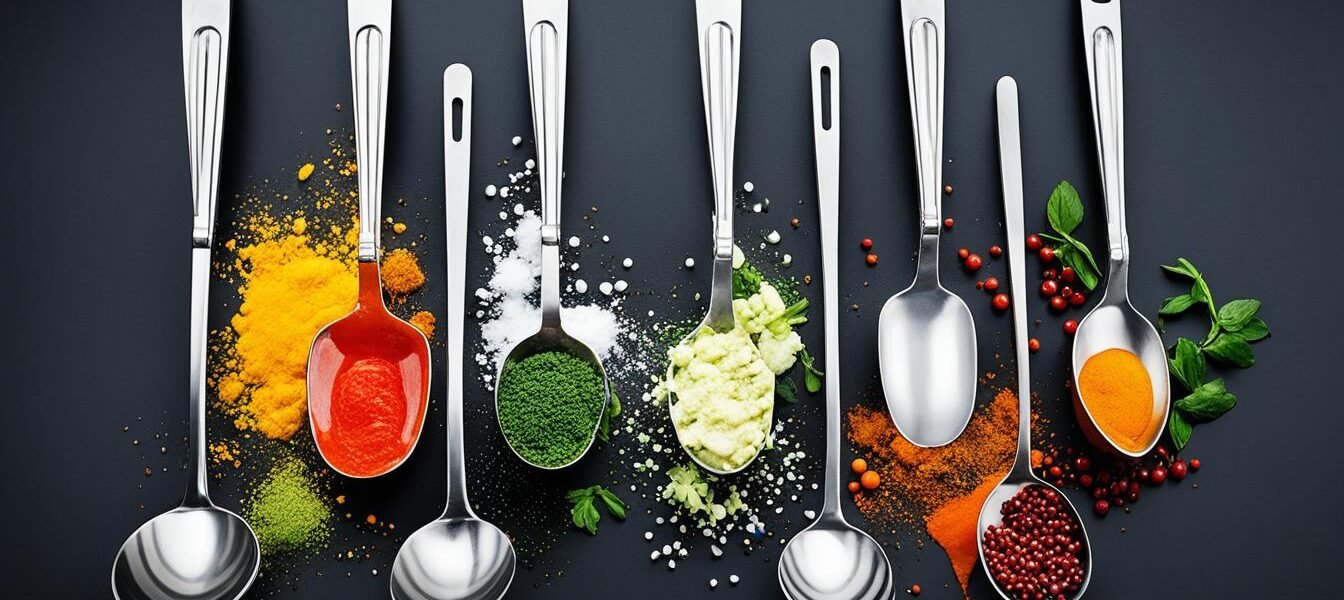Building Your Skills In Cooking As A Hobby
Cooking can be a fun and rewarding hobby. It brings joy and accomplishment. Whether you’re just starting or have lots of experience, there is always more to learn. This guide will help you improve your cooking. You’ll go from basic skills to being creative in the kitchen.
Key Takeaways : Skills In Cooking
- Discover the joy of cooking as a fulfilling hobby
- Explore a wide range of cooking techniques and culinary skills
- Unleash your creativity by experimenting with flavors, ingredients, and presentation
- Learn to cook for yourself, your loved ones, and even special occasions
- Develop a growth mindset and embrace learning from failures in the kitchen
Why Cooking Is an Excellent Hobby
Cooking is more than just making food. It brings a lot of joy and benefits. This hobby adds fun to your meals, lets you be creative, and brings people closer. The journey of cooking can change your life.
Break the Monotony of Mealtimes
If you cook for fun, you learn new things. You can try recipes from all over the world and mix up different flavors. This makes your meals interesting and not so boring anymore. It’s great if you feel tired of the same food every day.
Unleash Your Creativity
The kitchen is a place to show who you are. You can mix ingredients in your own way and make food that’s unique to you. This makes you feel good and lets you be imaginative in the kitchen.
Bring People Together
Cooking can be a way to get closer to others. Whether it’s dinner with friends, a cooking lesson, or a family meal, it’s about being together. It creates memories and helps you learn about different foods and traditions.
At the end of the day, cooking is a wonderful hobby. It’s about more than just meals. It’s about fun, creativity, and sharing good times with others.
“Cooking is like love. It should be entered into with abandon or not at all.” – Harriet Van Horne
Getting Started with Cooking as a Hobby
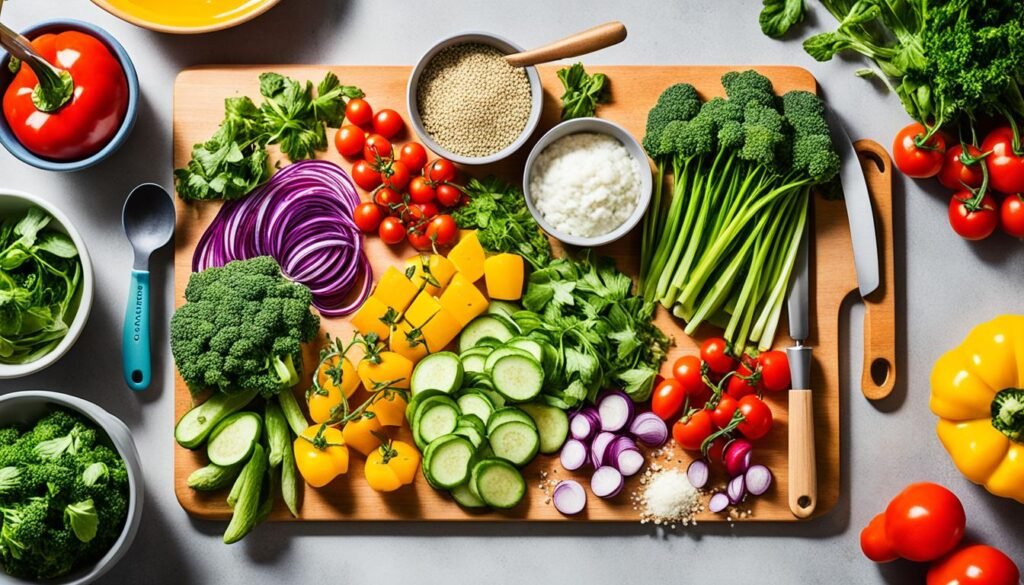
If you’re just starting to cook for fun, begin with simple recipes. You should work your way up to more complex dishes. This helps you learn step by step and improves your cooking over time.
Start Simple and Work Your Way Up
Start by learning how to chop, sauté, and season your food. Know your way around the kitchen and how to use basic tools. Also, learn to measure ingredients properly. Slowly, you can try new herbs, spices, and cooking ways. But, there’s no rush to cook hard recipes just yet.
Learn Essential Cooking Skills
As you dive into cooking, focus on these key skills:
- Kitchen Organization: Set up your kitchen for easy and fun cooking.
- Cooking Measurements: Learn to measure ingredients correctly for good recipes.
- Cooking with Herbs and Spices: Try out various herbs and spices to enhance your foods’ taste.
- Basic Cooking Techniques: Get good at cooking basics like sautéing, baking, and braising.
Starting with simple recipes and tasks is the best way to improve your cooking. As you master the basics, cooking fun and tasty meals becomes easier.
Cooking for Beginners: Tips and Tricks
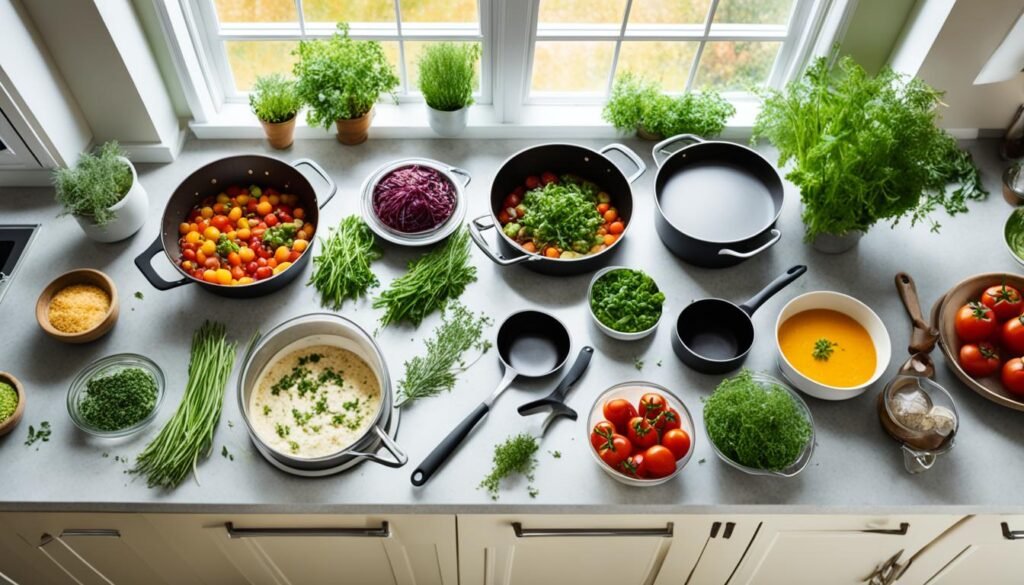
Starting in the culinary world, it’s key to form good habits early on. One top tip is to clean as you cook. It keeps you organized, cuts down on afterwards cleaning, and ensures kitchen safety.
Clean as You Cook
Cleaning while you cook changes the game for novices. It’s simple to feel swamped by messes. But tidying up a bit as you proceed saves time and effort later. Get a leg up with these pointers:
- Wipe down surfaces and utensils when done with them.
- Rinse dishes, putting them in the sink or dishwasher right away.
- Get rid of trash and compost often.
- Keep your work area clean to avoid cross-contamination and ensure food safety.
Easy Recipes for Beginners
To kick off cooking as a pastime, start with easy recipes. These meals will boost your confidence and lay a good groundwork for more challenging dishes. Opt for recipes with basic ingredients and easy steps to get used to cooking.
| Recipe | Ingredients | Preparation Time |
|---|---|---|
| Grilled Chicken and Vegetables | Chicken breasts, bell peppers, zucchini, olive oil, salt, and pepper | 30 minutes |
| Baked Salmon with Roasted Potatoes | Salmon fillets, potatoes, olive oil, lemon, dill, salt, and pepper | 45 minutes |
| Vegetable Stir-Fry with Brown Rice | Assorted vegetables, soy sauce, garlic, ginger, brown rice | 25 minutes |
Don’t forget, meal prep can save time and make cooking simpler. Plan ahead and prep your ingredients early. This tactic will smooth out your cooking agenda and add joy to the experience.
“Cooking is like love. It should be entered into with abandon or not at all.” – Harriet Van Horne
Exploring Vegetarian Cooking
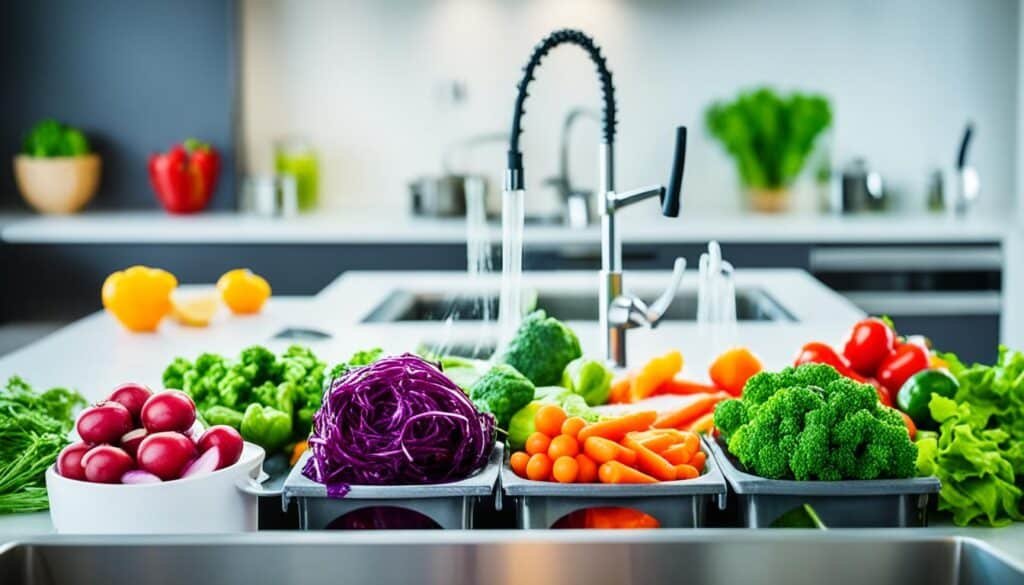
In recent years, there’s been a big rise in vegetarian cooking and plant-based alternatives. This change is making our meals more exciting, offering many new and tasty dishes. It also helps people cook in ways that are better for the environment and their wallets.
The Rise of Plant-Based Alternatives
There’s a growing variety of plant-based alternatives that look and taste like meat. This includes items such as burgers, sausages, nuggets, and dairy-free cheeses. They are easier to find and more affordable. This makes it simple for anyone to try vegetarian cooking at home.
Exploring International Cuisines
Trying international cuisines is a great way to find new healthy and flavorful vegetarian meals. For example, Indian curries and Mediterranean dishes are huge hits. These foods are not just good for you, but they’re often easy on the budget too. Exploring these foods can enhance your eating experience and cooking skills.
| Cuisine | Signature Vegetarian Dishes | Key Ingredients |
|---|---|---|
| Indian | Chana Masala, Aloo Gobi, Palak Paneer | Chickpeas, Potatoes, Spinach, Paneer (Indian cheese) |
| Mediterranean | Ratatouille, Hummus, Falafel | Eggplant, Zucchini, Chickpeas, Tahini |
| Asian | Vegetable Stir-Fries, Miso Soup, Pad Thai | Tofu, Mushrooms, Rice Noodles, Soy Sauce |
Choosing vegetarian cooking opens up a world of new tastes and options. It’s not just good for you, it’s good for the planet too. Plus, you get to enjoy foods from all over the globe.
Skills In Cooking: Creativity and Innovation
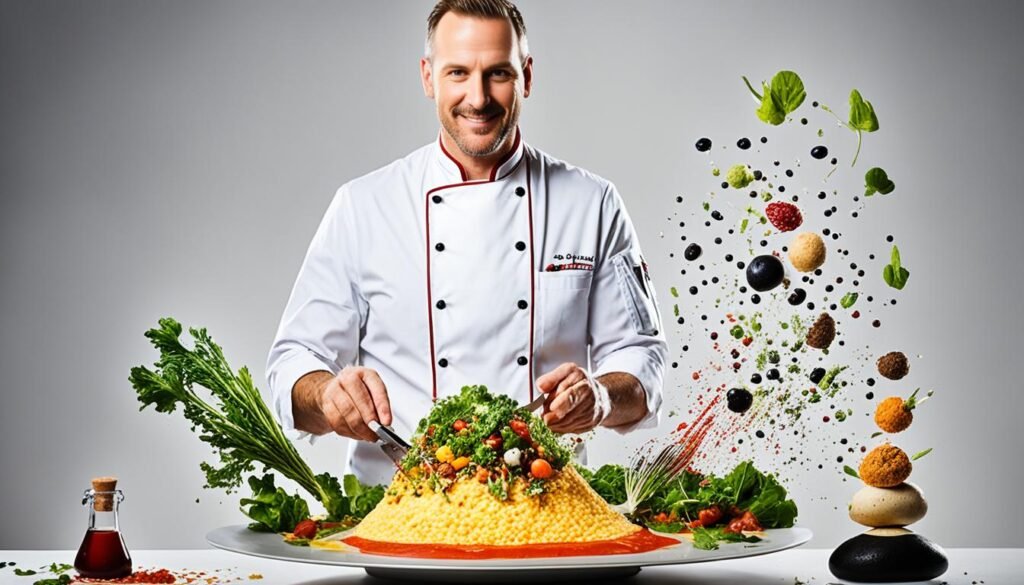
Cooking is more than simple recipes. To truly get better, you need to be creative in the kitchen. This means trying new flavors, ingredients, and making dishes look beautiful.
Being able to change recipes and pick the right foods is key. It changes cooking from a task to an art. Keep learning and you’ll see your cooking improve a lot.
Being creative and open to new tastes is crucial for cooks. Trying new recipes and understanding flavors can make your dishes outstanding. Cooking becomes a form of art this way.
- Combine different ingredients and try new spices to find interesting flavors.
- Learn plate decoration to make your food look great, perfect for photos.
- Change recipes to make them your own unique versions of classic meals.
- Pair foods in creative ways, using your knowledge to make tasty matches.
“Cooking is more than just food. It’s about sharing and caring – it shows love.” – Lidia Bastianich
By being creative in your cooking, you turn it into a fun and rewarding pastime. Let your love for food show in every recipe.
Learning from Failures in the Kitchen
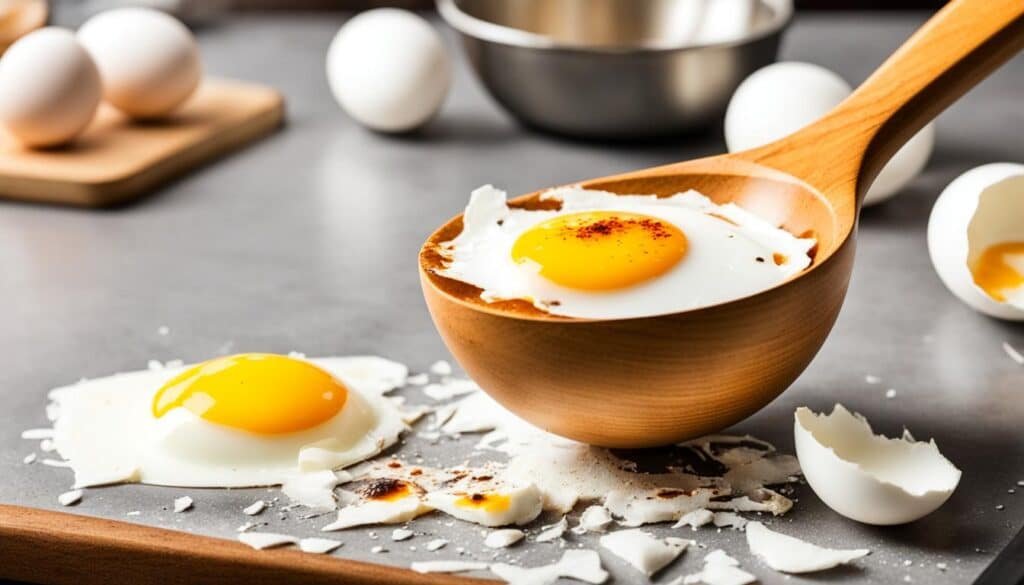
Cooking is a skill that takes time to master, and mistakes happen, especially at the start. Yet, these mistakes are lessons that help you become a better cook. With the right attitude, you can turn setbacks into opportunities for growth. Because of this, you gain a better understanding of how cooking works, taste combinations, and how to solve problems.
Resilience and Growth Mindset
Having a positive and growth-focused mindset is crucial in cooking. Instead of being down when things go wrong, see them as chances to get better. This change in thinking can make the cooking journey more enjoyable. You’ll love the process even if the results aren’t perfect.
Believing in a growth mindset is knowing that practice and effort make you better. So, when a dish doesn’t come out right, see it as a lesson. Think about what you can do differently next time. Doing this not only improves your cooking but also makes you tougher. This way, you can handle mistakes and keep moving forward in your cooking adventures.
“Failure is simply the opportunity to begin again, this time more intelligently.” – Henry Ford
Learning from your mistakes leads to a deeper connection with cooking. It becomes a way not just to make food but enjoy the process. So, every cooking mistake is a chance to learn. You enhance your skills, discover better ways to cook, and find new tastes.
Just remember, every great cook had to go through both good and bad times in the kitchen. Focus on learning from errors, and let your positive mindset and resilience lead you to cooking excellence.
Creating an Environment for Culinary Experimentation
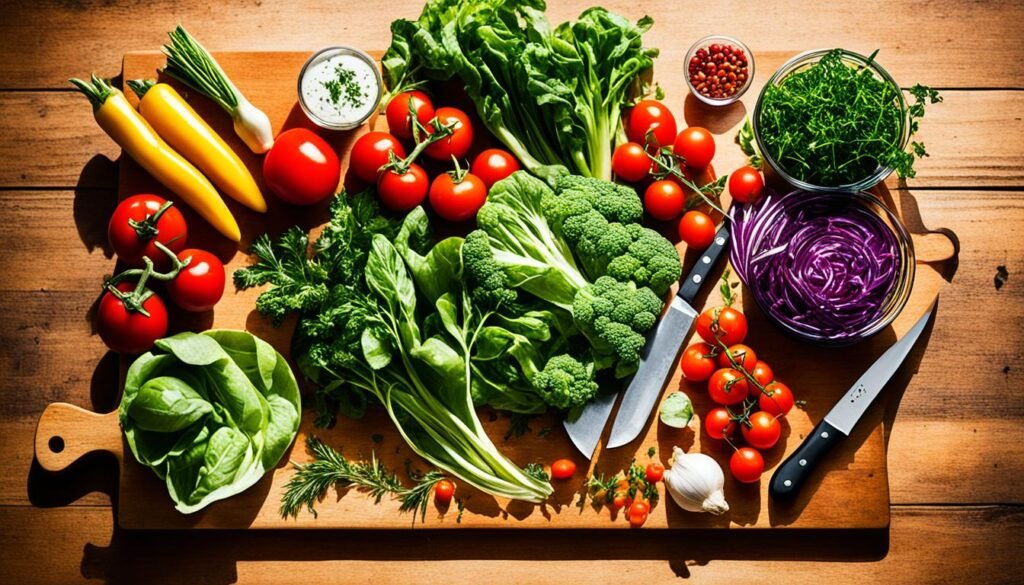
Making a place where you can experiment in the kitchen is key. It’s about feeling free to try new things without worrying about messing up. Feeling safe to make mistakes and learn is essential for being creative and trying new things.
Encouraging continuous learning helps you reach your cooking potential. It’s all about being open to new ideas and not afraid to take a chance. This way, you get to try new flavors and techniques without the fear of not doing well.
- Encourage a growth mindset where mistakes are seen as opportunities to learn and improve.
- Celebrate small successes and progress, rather than focusing solely on perfection.
- Surround yourself with supportive friends or family who are willing to try your culinary creations and provide constructive feedback.
- Experiment with new recipes and cooking methods without worrying about the outcome.
Building a place that’s all about culinary experimentation lights up your love for cooking. It helps you feel like an explorer in the kitchen. You gain confidence and flexibility, becoming more adventurous and learning as you go.
“Cooking is an endless journey of discovery, where every experiment is an opportunity to uncover new flavors and techniques.”
To really succeed, keep an attitude of curiosity, resilience, and being open to learning. Creating this kind of atmosphere is crucial. It helps you on the path to becoming a talented home cook.
Maximizing Available Resources
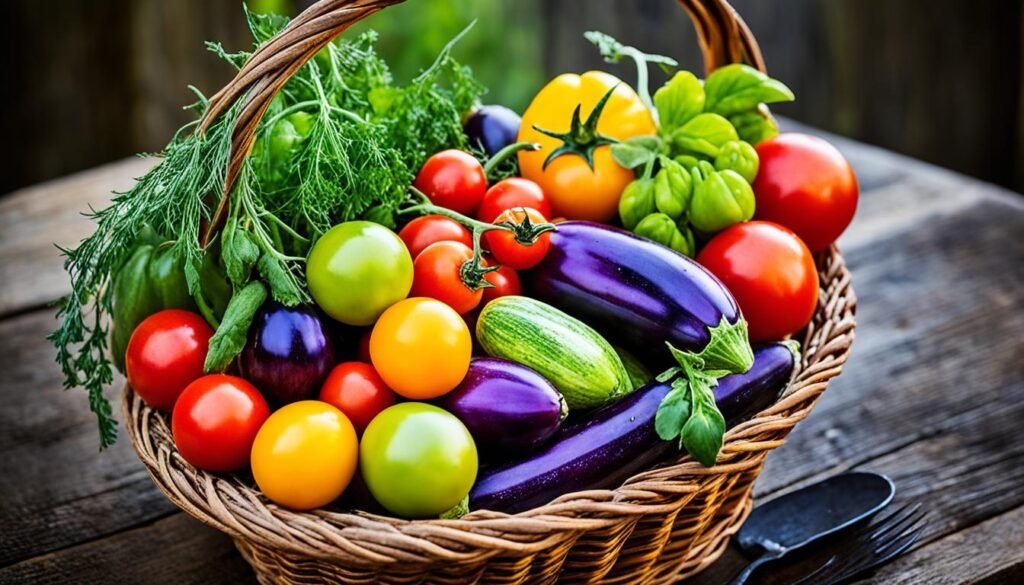
Being a home cook means using what you have wisely. This starts with choosing fresh, high-quality ingredients. Also, trying out new ingredient mixes can really improve your dishes. Use what’s in season, check out farmers markets, and get creative to get more from your money. This way, you’ll always be learning and finding new tastes to enjoy.
Ingredient Selection and Combination
The key to great cooking is picking the best ingredients. Look for fresh, seasonal produce at the store or farmers market. These are tastier, healthier, and often cheaper than off-season items. Mix them with basic pantry goods and proteins to make delicious and balanced meals.
After buying your ingredients, it’s time to get adventurous with ingredient combinations. Try out different flavors, textures, and cooking styles. Mixing things in new ways can open up a whole new world of taste. Be bold and experiment with pairings, taking ideas from all over the globe.
- Embrace seasonal produce for maximum flavor and nutrition
- Discover local farmers markets for the freshest, most budget-friendly ingredients
- Experiment with creative ingredient combinations to expand your culinary repertoire
- Draw inspiration from diverse cuisines and cooking styles to enhance your dishes
Using available resources smartly and focusing on ingredient selection and combination can really boost your cooking at home. Enjoy the journey of discovering new flavors while keeping an eye on your budget. Let your cooking creativity shine in the heart of the home, the kitchen.
“Cooking is like painting or writing a song. Just as there are only so many notes or colors, there are only so many flavors – it’s how you combine them that sets you apart.”
– Wolfgang Puck
Also Read : Strumming From Scratch: A Beginner’s Guide To Playing The Guitar
Conclusion
Cooking can be a deeply rewarding hobby. It’s not just about making food. It’s about learning and growing. By being open to new things and always learning, you can cook amazing dishes.
It doesn’t matter if you’re just starting or have been cooking for years. Cooking can make you love trying new foods. It can also help you make friends. The things you learn in the kitchen can also help you in life.
So, put on your apron and get cooking. Enjoy the ups and downs. Let the love for food push you to get better at cooking.
FAQs
Why is cooking a great hobby?
Cooking is more than just preparing meals. It can add excitement to your daily eating routine. It lets you be creative and share special moments with others.
It’s also a way to relax. As you cook, you focus on what you’re making, leaving behind your worries.
How do I get started with cooking as a hobby?
To start, keep it simple. Learn the basic skills like chopping and sautéing. Get to know your kitchen tools and how to use them.
As you get more skilled, you can try new recipes. This includes using different herbs, spices, and cooking techniques.
What are some tips for beginner cooks?
Keep your kitchen clean as you cook. This makes everything go smoother. It cuts down on the mess afterward and keeps your food safe.
Start with easy recipes. This will help you gain confidence. Soon, you’ll be ready to tackle more challenging dishes.
How can vegetarian cooking be a good starting point?
Vegetarian food is great for beginners. There are many tasty plant-based options available. You can try out recipes from different cultures that focus on vegetables.
How can I develop creativity and innovation in the kitchen?
To be creative, try mixing flavors and ingredients in new ways. Experiment with how you decorate and present your dishes. Be open to trying different recipes and techniques.
Adapting recipes and coming up with your own ideas is key. Pushing yourself to think outside the box will make cooking more fun and interesting.
How can I learn from failures in the kitchen?
It’s important to see failures as learning experiences. Don’t be discouraged if a dish doesn’t turn out right. Use it as a chance to understand cooking better.
With the right attitude, you can enjoy the process of cooking. Even mistakes can lead to new discoveries.
How can I create an environment that encourages culinary experimentation?
To experiment freely, create a no-pressure zone in your kitchen. This is where you can try new things without worrying about being perfect.
Remember, it’s okay to make mistakes. This is how you learn and grow as a cook.
How can I make the most of the resources available to me?
Work with what you have at home. Choose the best ingredients you can find. Mix and match them in interesting ways to enhance your dishes.
Using seasonal foods and exploring local markets can also inspire your cooking. Being resourceful and budget-conscious can open new culinary doors for you.
